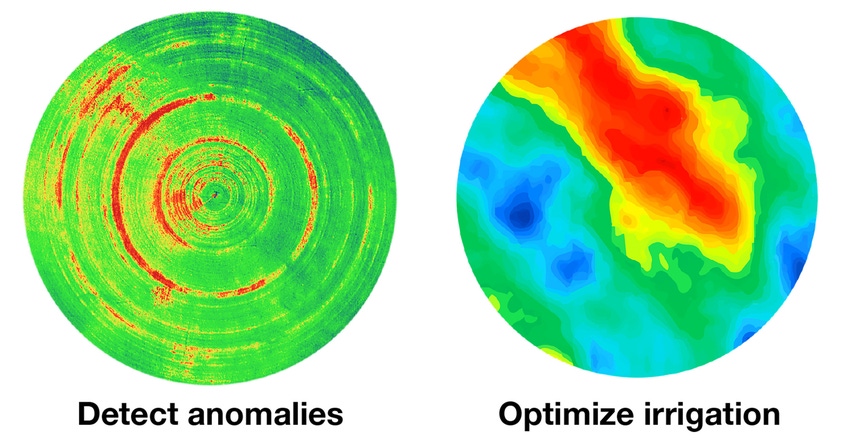
Last November, Valmont Industries hosted an Ag Tech Summit, where irrigation professionals, ag tech companies and public officials from the U.S. and Israel gathered to discuss ways in which tech startups based in Israel could work closer with U.S.-based irrigation companies such as Valley Irrigation — and ways in which center pivots could be used for purposes beyond irrigation.
Those discussions recently came to fruition when Valmont and Prospera Technologies announced a global partnership, with the goal of creating autonomous crop management tools.
Prospera, an Israeli machine-learning and artificial intelligence company founded in 2014, has developed analytics, algorithms and data layering to provide growers with irrigation and crop recommendations. Prospera monitors more than $5 billion worth of greenhouse production.
The exclusive partnership will integrate Prospera's artificial intelligence technology with center pivot irrigation and will center around the transformation of the center pivot from solely an irrigation machine to an autonomous crop management system, says Darren Siekman, vice president of business development at Valley Irrigation.
"The pivot is so unique because it is constantly in the field," Siekman says. "We know there are a ton of sensors and connected devices available, and we also know we can leverage the center pivot as the platform to do more than water delivery."
Beyond irrigation
This spring, the two companies plan to launch a new service, Anomaly Detection. Siekman notes the service applies three A's to data and crop management: acquisition, analytics and action.
"Whether it's satellites, drones or even sensors mounted on the pivot, there's so much data out there, and it's really easy to become overwhelmed with how to handle all of the data — even from an individual field, much less multiple pivots," Siekman says. "What Prospera has done in the greenhouse industry is the analysis piece. We can take the analysis and drive the action piece from it."
Anomaly Detection will use commercially available imagery from satellites and manned aircraft and analysis through Prospera's artificial intelligence engine to detect anomalies or issues in crop fields, and notify growers to address the issue early. This might include something as simple as a plugged nozzle.
"You can't necessarily see a plugged nozzle in the early stages,” Siekman says. “That's what's exciting about the analysis piece. The AI engine is picking that up before the naked eye can pick it up, in many cases. There are a surprising number of pivots where we see differences between what the naked eye sees and what we're identifying with this technology, and I think that's a great opportunity for the grower to irrigate more efficiently and reduce input costs."
Users can receive alerts and updates several ways, including through AgSense, via email or as a text message. The service will be available from Valley Irrigation for all brands of pivots through a subscription-based model or as an AgSense premium tier.
Siekman adds the grower oversees who has access to their field data and can choose to fix the problem themselves, or share the information with an irrigation dealer, for example, who also can receive alerts and make a service call to fix any issues that arise.
Autonomous future
The service initially will use commercially available imagery from satellites and manned aircraft. Moving forward, additional imagery and sensor technologies will be added — including pivot-mounted sensors — as the partnership gets closer to its goal of creating an autonomous crop management system.
"That's where we feel the path forward is to full autonomy and making the center pivot more than what it's used for today," Siekman says. "Currently, it's using a combination of technologies that are commercially available, and adding Prospera's proprietary algorithms. That is the secret sauce, because Prospera is taking volumes of data and honing it down based on what they've learned in the past, what we've learned, and what we're learning together."
Anomaly Detection will be launched in the spring, and additional features will be added in the coming years — including variable-rate irrigation and scheduling prescriptions created using the crop water stress index, and pest and disease control.
The joint technology is expected to reach 1 million acres by 2020. To develop the technology, the two companies collectively plan to invest more than $40 million over the next three years.
Learn more at valleyirrigation.com.
About the Author(s)
You May Also Like






